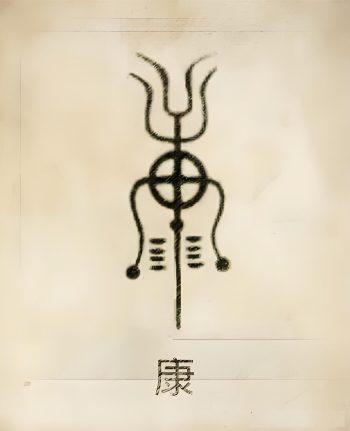The Kang (kāng)surname is one of China’s oldest and most culturally rich family names, embodying a history of multicultural integration and profound historical significance. From its origins in the aristocracy of the Zhou Dynasty to its connections with ancient Central Asian kingdoms, and from name changes to ethnic assimilation, the Kang surname reflects the dynamic evolution of Chinese society. This article explores the origins of the Kang surname, its historical figures, cultural significance, and its impact on society.

Ⅰ、Origins of the Kang Surname
1. The Ji Clan Origin
The primary origin of the Kang surname traces back to the Western Zhou Dynasty (1046–771 BCE). Ji Feng, the younger brother of King Wu of Zhou, was granted the territory of Kang (modern-day Yuzhou, Henan) for his effective governance. Later, he was enfeoffed as the ruler of Wei (modern-day Qi County, Henan), where he skillfully managed the remnants of the Shang Dynasty. Upon his death, he was posthumously honored with the title Kang, meaning "peace and prosperity." His descendants adopted this title as their surname, forming the main branch of the Kang family.
2. The Kangju Kingdom of Central Asia
During the Han Dynasty (206 BCE–220 CE), envoys and migrants from the Kangju Kingdom (located in modern-day Kazakhstan) settled in China and adopted "Kang" as their surname. Historical records from the Tang Dynasty mention Prince Kang Cheng, who settled in the Hexi Corridor of Gansu Province in 21 BCE, establishing a prominent Kang lineage.
3. Avoiding taboo by changing surname
Song Dynasty Name Change: To avoid using the name of Emperor Taizu of Song (Zhao Kuangyin), some families with the surname Kuang changed their name to Kang, particularly in Jiangxi and Hunan.
4. Ethnic Assimilation:
During the Jin and Qing dynasties, ethnic groups such as the Jurchen "Nara" clan, the Manchu "Hesheri" clan, and the Mongol "Zhuoergute" clan adopted the Kang surname, showcasing the blending of cultures.
Ⅱ、Historical Figures
1. Ancient Pioneers
Kang Shu: The founding ruler of the Wei State, known for his benevolent governance, laid the moral foundation for the Kang family.
Kang Tai: A navigator from the Eastern Wu Kingdom during the Three Kingdoms period, he authored Wu Shi Wai Guo Zhuan, the earliest record of Southeast Asian geography, earning him the title "Marco Polo of the East."
2. Cultural Icons
Kang Hai: A Ming Dynasty literary figure and one of the "Former Seven Masters," his satirical play The Wolf of Zhongshan remains influential.
Kang Kunlun: A Tang Dynasty pipa virtuoso, representing the pinnacle of Tang music culture.
3.Modern Reformers
Kang Youwei: A leader of the late Qing Dynasty’s Hundred Days’ Reform, he advocated for constitutional monarchy and authored The Book of Great Unity, blending Chinese and Western philosophies.
Kang Keqing: Wife of Zhu De, a revolutionary and advocate for women’s liberation and education.
Ⅲ、Cultural Significance
1.Ancestral Halls and Clan Culture
The Kang surname’s ancestral halls, such as those in Xi’an (Shaanxi) and Dongping (Shandong), are cultural landmarks. The family motto, "Cultivate a Pure Heart, Aspire to Greatness," reflects their emphasis on education and moral integrity.
2.Educational Legacy
The Kang surname’s teachings emphasize "learning as the foundation" and "self-reflection," shaping a tradition of scholarly pursuit and ethical behavior.
3.Philosophical Contributions
Kang Youwei’s reformist ideas and Kang Shu’s benevolent governance reflect the Kang surname’s commitment to practical and ethical leadership.
Ⅳ、Social Impact
1.Population Distribution and Migration
Ancient Migration: During the Wei and Jin dynasties, the Kang family migrated from Gansu to Shaanxi, and later to Zhejiang during the Tang Dynasty.
Modern Distribution: Today, there are approximately 3.36 million people with the Kang surname, concentrated in Anhui, Sichuan, and Gansu. In Taiwan, the Kang surname is prominent in Pingtung and Tainan.
2.Global Influence
Overseas Chinese: Since the Qing Dynasty, Kang descendants from Fujian and Guangdong have migrated to Southeast Asia and North America, establishing clan associations in Singapore and Malaysia.
Modern Achievements: Kang descendants excel in fields such as science and art, including atmospheric physicist Kang Zhenchao and pianist Kang Yongze.
Conclusion:
The Kang surname’s thousand-year history is a testament to the enduring power of cultural integration and ethical leadership. From Kang Shu’s benevolent governance to Kang Youwei’s reformist vision, from the Silk Road to modern scientific achievements, the Kang surname continues to resonate with the pulse of Chinese civilization. Today, Kang descendants worldwide carry forward this rich legacy, contributing to diverse fields and promoting cultural exchange.